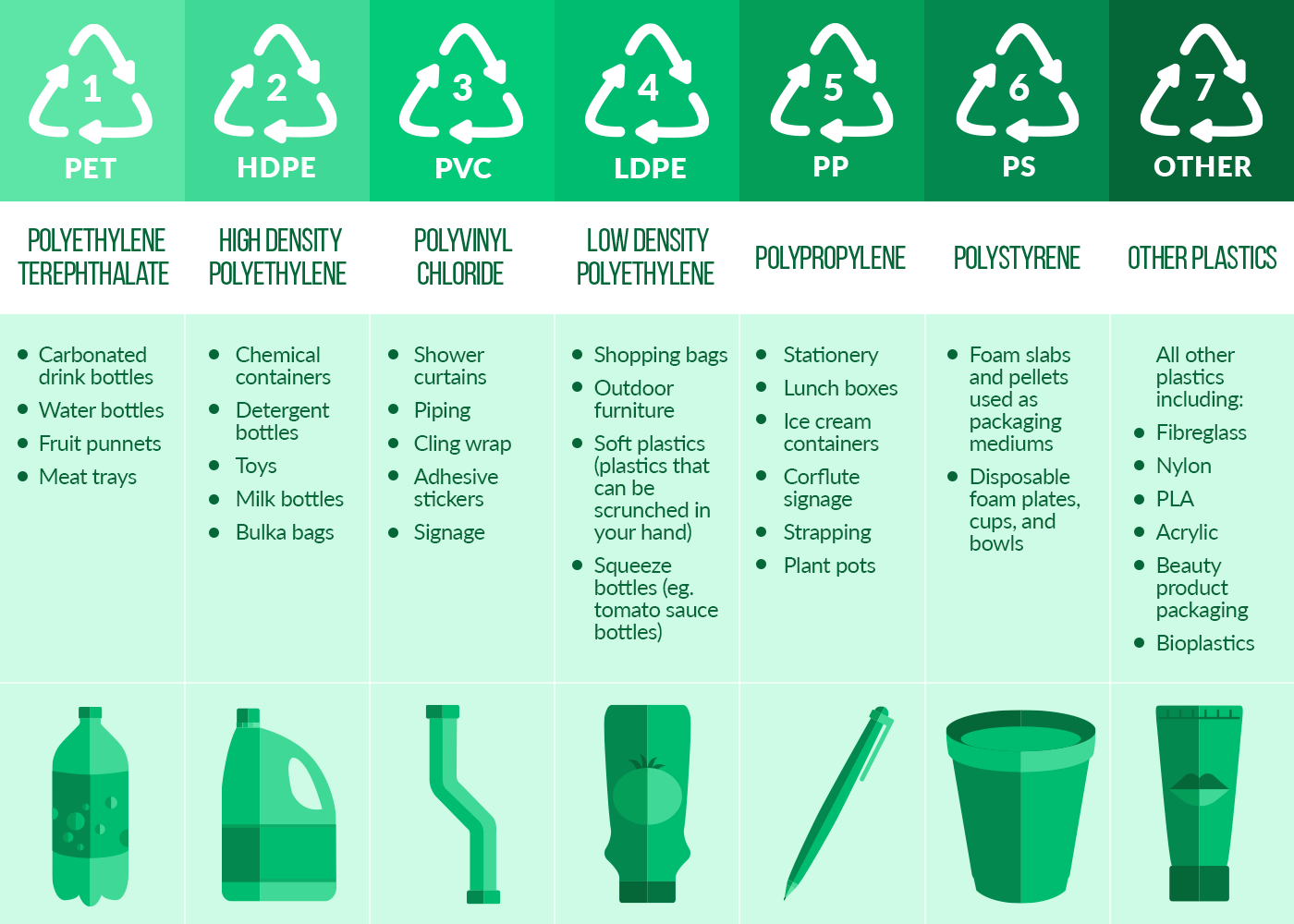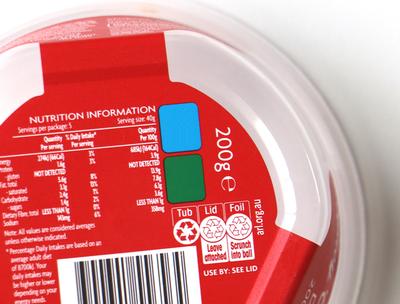In 2020-21, about 2.63 million tonnes of plastic waste was generated in Australia by households and businesses. That's 102kg per person! 1 But there are easy actions we can take to reduce the plastic waste we send to landfill that will boost our economy, provide more green jobs, and preserve our natural resources.
UNDERSTANDING PLASTIC IDENTIFICATION CODES
Most products and pieces of packaging made from plastic have a small triangle on them with a number inside. This is a plastic identification code (sometimes called the PIC), used to identify the type of plastic the product is made from. The triangle is often confused with the global symbol for recycling, the Mobius Loop, but it is not an indication the item can be recycled.

What's the purpose of these codes?
The purpose of these symbols is to communicate the type of plastic that has been used to make the item.
Should I pay attention to them?
You shouldn't use them to judge the recyclability of an item, but they can be helpful if you need to know what type of plastic has been used to make a product. Some types of plastic are harder to recycle than others, so this information is very important to recyclers.
If you're unsure a plastic item can be recycled, look for the Australasian Recycling Label, the only evidence-based recycling label for households. These labels are there to help you recycle correctly and stress less, so be sure to check the label before you chuck it! If the packaging doesn't have the Australasian Recycling Label on it, check with your council to see if it can go in the recycling bin.

USING THE WASTE HIERARCHY
Recycling isn't the only way to improve the way we deal with plastic waste. The 'waste hierarchy' is a framework that ranks the methods of waste disposal in order of what is least to most harmful to our environment. It helps to determine what actions have most impact. Generally, the higher up the waste hierarchy, the bigger the positive impact.
Click on each segment of the graphic to find out more.
RECYCLING OPTIONS
- Polystyrene Foam is a type of plastic used to make a range of products including takeaway containers and packaging pellets. It should never be put in your recycling bin at home, but there are specialised recycling services in some parts of Australia.
- Plastic Bottles and Containers are mostly made of recyclable plastics. Check these items for labels like the Australasian Recycling Label to make sure you recycle them correctly.
- Container Deposit Schemes are available in most states and territories in Australia. Eligible drink containers can be returned for cash or donations that benefit your community.
- Soft Plastics (basically anything you can scrunch in your hand including plastic bags) should not be put in your household recycling bin.
- Some councils have set up recycling drop-off points for soft plastics since REDcycle paused collections. Check directly with your council.
- RecycleSmart is a recycling service that collects items from your door and takes them to recycling facilities in your local area. They specialise in hard to recycle items like soft plastics, clothes, and lightbulbs. They currently offer free, recurring services in some areas of Sydney, while also providing paid, on-demand services for the city of Sydney, Canada Bay, and Waverly.
- Curby partners with councils to collect targeted materials such as soft plastics and coffee capsules from the community via the existing home recycling bin.
INFORMATION FOR BUSINESS
Businesses and workplaces have an equally important responsibility in turning around Australia's plastic problem. They are also more heavily impacted by the single-use plastic bans that have been rolling out across the country.
Planet Ark has created a guide, How to reduce and recycle plastic at work, which will help you reduce the amount of plastic you use at your business or workplace, increase the reuse and recycling of plastics, and provide suggestions for more sustainable alternatives to plastic products where appropriate.
It will be especially helpful to small and medium sized businesses and workplaces seeking to improve their management of plastics including single-use plastic products, plastic strapping, polystyrene, plastic bags, plastic wrap and more.
SINGLE-USE PLASTICS
Single-use plastics refer to any plastic product that is designed to be used once and then thrown away. Some of them are recyclable, like plastic drink bottles and takeaway food containers. However, many common single-use plastics should not be put in your household recycling bin, including plastics bags, cutlery, coffee cups and lids, plates, straws, beverage stirrers, and polystyrene containers.
Many single-use plastic products are now banned in different parts of Australia. Find out what's banned in your state or territory.
WANT TO LEARN MORE?
Reducing plastic use, especially single-use items, is the best way to address the environmental problem of plastic pollution. There is still work to be done to develop Australia's capacity to recycle plastic through infrastructure or economic incentives and government policies to use recycled content. However, there are already some great examples of innovative programs and companies leading the way in Australia.
Australian Recycled Plastics: A facility which sorts, cleans, and remanufactures plastics under one roof.
Close the Loop: In partnership with Downer, developed Tonerplas asphalt using recycled soft plastics, glass, and toner cartridges.
iQ Renew: Paving the way in chemical recycling with Licella's Cat-HTR technology for plastics that can't be physically recycled.
Plastic Forests: Manufacture Mini Wheel Stops plus more from recycled plastic bags and packaging.
Replas: Produce outdoor seating, decking and more made from recycled plastics.
Unilever: Partnering with Visy & Pact to source Australian-recycled HDPE plastic, Australian-made bottles (Dove, OMO, TRESemme, Surf, and Toni & Guy) are made with 25-70% recycled plastic.
Visy: Their PET/HDPE plastics plant makes 100% recycled bottles for companies like Coles, Natures Organics and Schweppes Australia.
